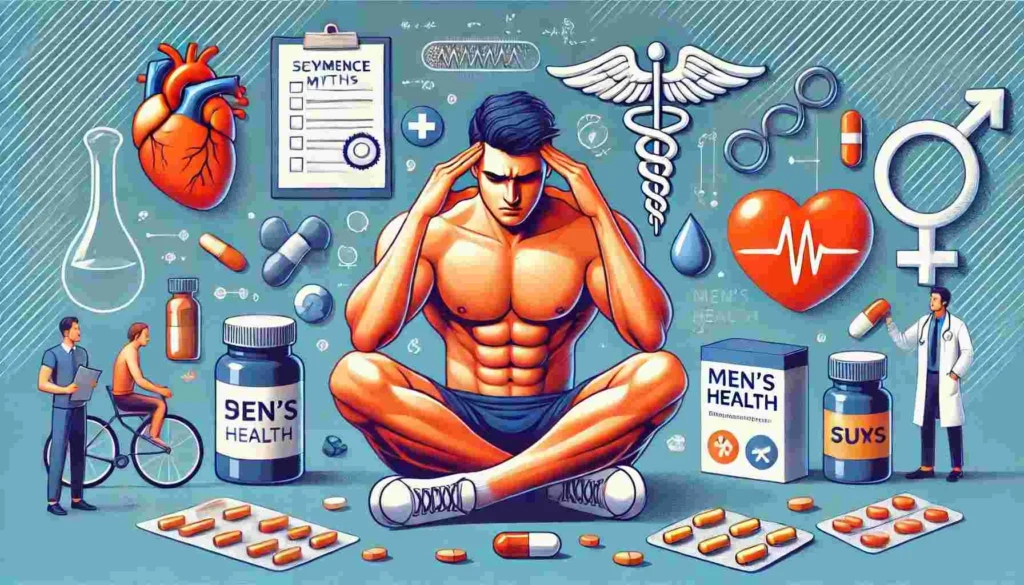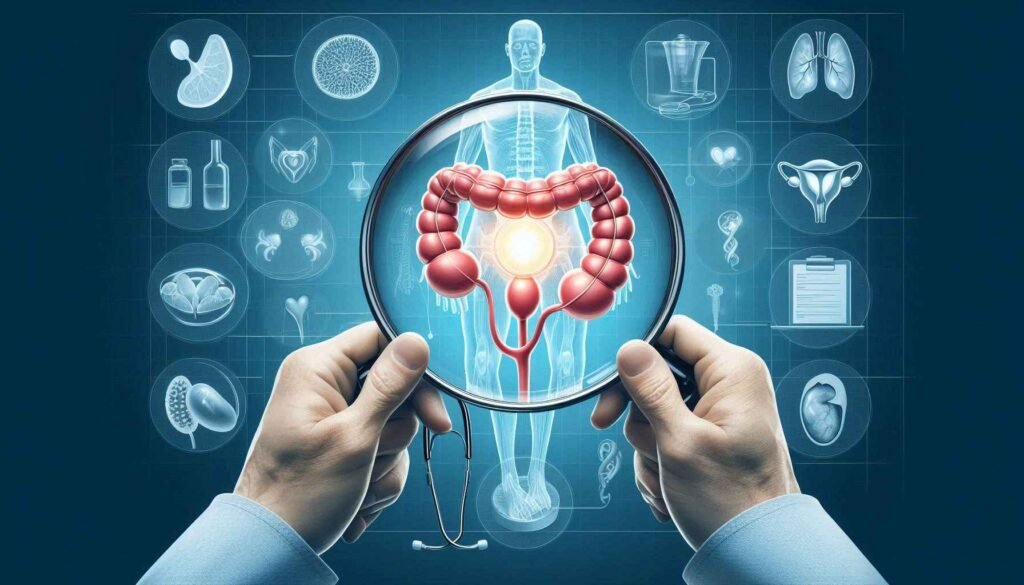
Common Myths About Men’s Health Debunked
Introduction
When it comes to men’s health, countless myths and misconceptions have perpetuated over the years. These myths can lead to misinformation, missed health opportunities, and even dangerous assumptions about wellness. Let’s break down some of the most common myths surrounding men’s health and provide you with the facts you need to take control of your well-being.
Myth 1: Men Don’t Need to Worry About Their Health Until They’re Older
Many believe that health issues only become significant for men after a certain age, but this couldn’t be further from the truth.
- Reality Check:
Health is a lifelong commitment. Conditions like hypertension, diabetes, and heart disease often develop due to years of neglecting preventative care. Starting healthy habits early, such as regular exercise, a balanced diet, and routine check-ups, can significantly lower the risk of chronic illnesses later in life. - Why It’s Dangerous:
Ignoring health until later years allows silent conditions like high blood pressure or cholesterol to go unnoticed, leading to severe complications. - Takeaway:
No matter your age, it’s crucial to prioritize health now. Regular screenings and an active lifestyle can lay the foundation for a longer, healthier life.
Myth 2: Men Shouldn’t Talk About Mental Health
Society often perpetuates the stereotype that men must always appear strong, stoic, and unaffected. This has led many men to shy away from discussing their mental health struggles.
- Reality Check:
Mental health affects everyone, regardless of gender. Depression, anxiety, and other mental health issues are not signs of weakness but rather conditions that require care and attention. - Why It’s Dangerous:
Suppressing emotions or refusing to seek help can worsen mental health problems, sometimes leading to severe consequences, including substance abuse or suicide. - Takeaway:
It’s okay for men to seek therapy, talk to friends, or lean on support groups. Mental health is just as important as physical health.
Myth 3: Prostate Health Only Becomes a Concern After 50
Prostate health is a critical aspect of men’s health, yet many believe it only becomes relevant in their 50s or later.
- Reality Check:
While prostate cancer risk increases with age, issues like prostatitis and benign prostatic hyperplasia (BPH) can affect younger men. Additionally, early screening can lead to better outcomes if issues arise later in life. - Why It’s Dangerous:
Delaying attention to prostate health can result in missed early signs of potential problems. - Takeaway:
Men should start discussions about prostate health with their doctor in their 30s or 40s, especially if there’s a family history of prostate conditions.
Myth 4: Men Don’t Need to Worry About Osteoporosis
Osteoporosis is often considered a “women’s disease,” but men are also at risk, especially as they age.
- Reality Check:
Men over the age of 50 are at a significant risk of fractures due to osteoporosis. Factors such as low testosterone, poor diet, and sedentary lifestyles contribute to bone density loss. - Why It’s Dangerous:
Ignoring bone health can lead to fractures that greatly impact mobility and quality of life in later years. - Takeaway:
Incorporate calcium-rich foods, vitamin D, and weight-bearing exercises into your routine to support bone health.
Myth 5: Men Don’t Need Routine Check-Ups if They Feel Fine
“I feel fine, so I must be healthy.” This common assumption prevents many men from visiting the doctor regularly.
- Reality Check:
Many health issues, like high blood pressure, high cholesterol, or pre-diabetes, show no symptoms in their early stages. Routine check-ups can detect and address these “silent killers” before they become serious. - Why It’s Dangerous:
Skipping regular check-ups can result in late diagnoses of conditions that might have been easily manageable if caught early. - Takeaway:
Even if you feel healthy, annual check-ups are a critical part of preventative healthcare.
Myth 6: Sexual Health Isn’t a Major Concern for Younger Men
Sexual health is often overlooked by younger men, who assume issues like erectile dysfunction (ED) only occur with age.
- Reality Check:
Sexual health problems can affect men of any age. Stress, mental health issues, and lifestyle factors can contribute to conditions like ED, even in younger men. - Why It’s Dangerous:
Ignoring sexual health concerns can point to underlying issues, such as cardiovascular disease or diabetes. - Takeaway:
If you notice changes in your sexual health, consult a healthcare professional to address the root cause.
Myth 7: Men Don’t Need a Skincare Routine
Skincare is often seen as a “women’s concern,” leading many men to neglect their skin health altogether.
- Reality Check:
Men’s skin requires just as much care and attention. Factors like shaving, outdoor activities, and environmental pollution can take a toll on the skin, leading to issues like dryness, premature aging, and even skin cancer. - Why It’s Dangerous:
Neglecting skin health can increase the risk of long-term damage, including skin cancers like melanoma, which are often diagnosed later in men. - Takeaway:
A simple skincare routine—cleanser, moisturizer, and sunscreen—can protect and nourish the skin, helping it stay healthy and youthful.
Myth 8: Eating Meat Automatically Means You’re Getting Enough Protein
Men are often encouraged to consume a high-protein diet, with the assumption that eating meat alone will meet their dietary needs.
- Reality Check:
While meat is a good source of protein, it’s not the only source, nor does it guarantee a balanced diet. Relying solely on meat can neglect other essential nutrients like fiber, vitamins, and healthy fats. - Why It’s Dangerous:
Overconsumption of red or processed meats has been linked to increased risks of heart disease, certain cancers, and high cholesterol. - Takeaway:
Incorporate a variety of protein sources, such as legumes, nuts, eggs, fish, and plant-based options, for a balanced and heart-healthy diet.
Myth 9: Strength Training Is Only for Bodybuilders
Some men avoid strength training because they think it’s only for those looking to bulk up or compete professionally.
- Reality Check:
Strength training is beneficial for everyone, regardless of whether they want to build muscle mass. It improves bone density, boosts metabolism, enhances joint health, and increases overall strength. - Why It’s Dangerous:
Neglecting strength training can lead to muscle loss, weaker bones, and reduced mobility as men age. - Takeaway:
Incorporate strength exercises, such as weightlifting or resistance training, into your fitness routine at least twice a week to maintain a strong and resilient body.
Myth 10: Balding Only Happens to Older Men
Hair loss is often considered a problem for men in their 40s or 50s, but this misconception can lead to shock and insecurity when it starts earlier.
- Reality Check:
Male pattern baldness can begin as early as the late teens or 20s and is largely influenced by genetics and hormonal changes. - Why It’s Dangerous:
Avoiding early intervention limits the effectiveness of treatments that can slow hair loss or promote regrowth. - Takeaway:
If you notice signs of thinning hair or a receding hairline, consult a dermatologist early. Treatments like medication or lifestyle adjustments can help manage the condition effectively.
Myth 11: Men Don’t Need to Worry About Fertility
Fertility issues are often seen as a women’s problem, with little attention given to male reproductive health.
- Reality Check:
Men contribute equally to fertility, and factors like age, diet, lifestyle, and underlying health conditions significantly affect sperm quality and overall reproductive health. - Why It’s Dangerous:
Assuming fertility isn’t a concern can lead to delayed diagnosis and treatment for issues that could impact family planning. - Takeaway:
Healthy lifestyle choices, avoiding smoking and excessive alcohol, and regular medical check-ups are key to maintaining fertility health.
Myth 12: You Can Out-Exercise a Bad Diet
It’s a common belief that hitting the gym hard will cancel out poor eating habits.
- Reality Check:
While exercise is crucial, it cannot compensate for a consistently unhealthy diet. Nutrition plays a vital role in energy levels, muscle recovery, and long-term health. - Why It’s Dangerous:
Poor eating habits, regardless of physical activity, increase the risk of heart disease, obesity, and metabolic disorders. - Takeaway:
Combine regular physical activity with a balanced diet rich in whole foods, lean proteins, and healthy fats for optimal health.
Myth 13: Testosterone Therapy Is a Cure-All for Aging
Testosterone replacement therapy (TRT) is often marketed as a solution to all aging-related issues, from energy loss to reduced muscle mass.
- Reality Check:
While TRT can be beneficial for men with clinically low testosterone levels, it’s not a miracle solution. Many age-related changes are natural and require holistic approaches, including diet, exercise, and stress management. - Why It’s Dangerous:
Unnecessary testosterone therapy can lead to side effects like sleep apnea, mood changes, and increased risk of heart disease. - Takeaway:
Consult a healthcare provider to evaluate your testosterone levels and discuss whether TRT is appropriate. Focus on a balanced lifestyle to combat aging effectively.
Myth 14: Men Can Handle More Alcohol Than Women
There’s a long-standing myth that men can drink more alcohol than women without it impacting their health.
- Reality Check:
While men may metabolize alcohol differently due to body composition, excessive drinking carries significant health risks regardless of gender. - Why It’s Dangerous:
Heavy drinking increases the risk of liver damage, heart disease, and mental health issues. - Takeaway:
Drink in moderation and stay mindful of recommended alcohol limits to safeguard your health.
Myth 15: Snoring Is Harmless
Many men dismiss snoring as a normal, harmless occurrence, but it can signal a deeper health issue.
- Reality Check:
Snoring can indicate sleep apnea, a condition that disrupts breathing during sleep and increases the risk of heart disease, stroke, and fatigue-related accidents. - Why It’s Dangerous:
Untreated sleep apnea can significantly affect quality of life and overall health. - Takeaway:
If snoring is loud, persistent, or accompanied by pauses in breathing, consult a doctor for evaluation and potential treatment.
Myth 16: Men Don’t Get Breast Cancer
Breast cancer is often thought of as a women’s disease, leading many men to ignore potential symptoms.
- Reality Check:
While breast cancer is far less common in men, it does occur. Men have breast tissue, and cancers can develop there, particularly in those with a family history of the disease. - Why It’s Dangerous:
Late diagnoses due to lack of awareness often result in more advanced stages of cancer, making treatment more challenging. - Takeaway:
Men should be aware of symptoms like lumps, nipple discharge, or changes in the chest area and consult a doctor if they notice anything unusual.
Myth 17: Men Don’t Need Sunscreen
Many men believe that sunscreen is unnecessary unless they spend long hours outdoors or during summer vacations.
- Reality Check:
UV damage occurs year-round, even on cloudy days, and men are just as vulnerable to skin cancer as women. In fact, men over 50 have a higher risk of developing melanoma. - Why It’s Dangerous:
Skipping sunscreen increases the risk of premature aging and skin cancer, including potentially fatal melanomas. - Takeaway:
Use a broad-spectrum sunscreen with at least SPF 30 daily, especially on exposed areas like the face, neck, and arms.
Myth 18: Men Should Avoid Discussing Sexual Health Issues
Talking about sexual health problems is often stigmatized, leading many men to avoid the topic altogether.
- Reality Check:
Sexual health is a critical part of overall well-being, and issues like erectile dysfunction or low libido can often be symptoms of underlying conditions such as heart disease or hormonal imbalances. - Why It’s Dangerous:
Avoiding these discussions can delay treatment for potentially serious health problems. - Takeaway:
Openly discussing sexual health with a healthcare provider can lead to effective treatments and a better understanding of overall health.
Myth 19: Only Smokers Are at Risk for Lung Cancer
While smoking is the leading cause of lung cancer, many non-smokers falsely assume they’re immune to this disease.
- Reality Check:
Non-smokers can develop lung cancer due to factors like air pollution, radon exposure, or secondhand smoke. - Why It’s Dangerous:
Believing this myth can lead non-smokers to overlook symptoms like persistent cough or shortness of breath. - Takeaway:
Everyone should be vigilant about lung health and seek medical advice if they experience unusual respiratory symptoms.
Myth 20: Men Don’t Need to Worry About STDs If They’re in Long-Term Relationships
Monogamy is often equated with immunity to sexually transmitted diseases (STDs), but this isn’t always the case.
- Reality Check:
STDs can remain dormant for years, and prior infections may still pose health risks. Routine screenings are essential even in long-term relationships. - Why It’s Dangerous:
Ignoring regular STD testing can result in undiagnosed infections, which may lead to complications like infertility or chronic pain. - Takeaway:
Both partners in a relationship should prioritize regular sexual health check-ups to ensure long-term health.
Myth 21: If You’re Not Overweight, You’re Healthy
Being at a normal weight doesn’t automatically equate to being in good health.
- Reality Check:
Thin men can still have high cholesterol, elevated blood pressure, or poor cardiovascular health due to factors like diet, stress, and lack of exercise. - Why It’s Dangerous:
Relying solely on weight as a measure of health can lead to overlooked conditions that require attention. - Takeaway:
Focus on overall wellness by maintaining a healthy diet, exercising regularly, and scheduling routine medical exams regardless of your weight.
Myth 22: Men Shouldn’t Worry About Varicose Veins
Varicose veins are often dismissed as a cosmetic issue or a condition that only affects women.
- Reality Check:
Men can develop varicose veins too, and these can indicate poor circulation or other vascular issues. - Why It’s Dangerous:
Untreated varicose veins may lead to complications like pain, swelling, or even deep vein thrombosis (DVT). - Takeaway:
Seek medical advice if you notice swollen, twisted veins, especially if they’re accompanied by discomfort or skin changes.
Myth 23: All Fat Is Bad
Many men assume that all dietary fat is harmful, leading them to avoid it altogether.
- Reality Check:
Healthy fats, like those found in avocados, nuts, seeds, and fish, are essential for brain function, hormone production, and overall health. - Why It’s Dangerous:
Eliminating fats entirely can result in nutrient deficiencies and impact heart and brain health. - Takeaway:
Focus on incorporating healthy fats into your diet while limiting trans fats and excessive saturated fats.
Myth 24: Men Can’t Have Eating Disorders
Eating disorders are often associated with women, leaving many men unaware that they can experience these conditions too.
- Reality Check:
Men can struggle with disorders like anorexia, bulimia, and binge eating. Societal pressures, body image concerns, and stress are common triggers. - Why It’s Dangerous:
Men with eating disorders may avoid seeking help due to stigma, resulting in worsening health outcomes. - Takeaway:
If you or someone you know shows signs of disordered eating, seek support from a healthcare professional or counselor.
Myth 25: Men Are Less Likely to Get Depression
Depression is often underdiagnosed in men because they’re less likely to report symptoms or seek help.
- Reality Check:
Men are just as likely as women to experience depression, but they may express it differently through irritability, anger, or reckless behavior. - Why It’s Dangerous:
Ignoring symptoms of depression can lead to severe consequences, including substance abuse or suicide. - Takeaway:
It’s vital for men to recognize the signs of depression and seek support from mental health professionals or loved ones.



